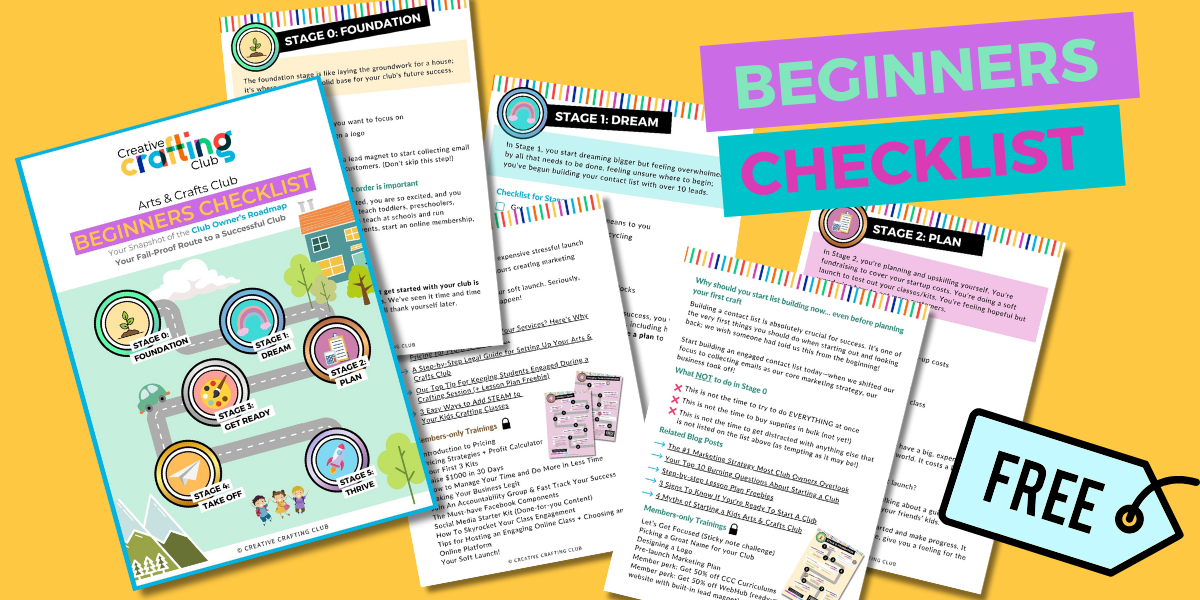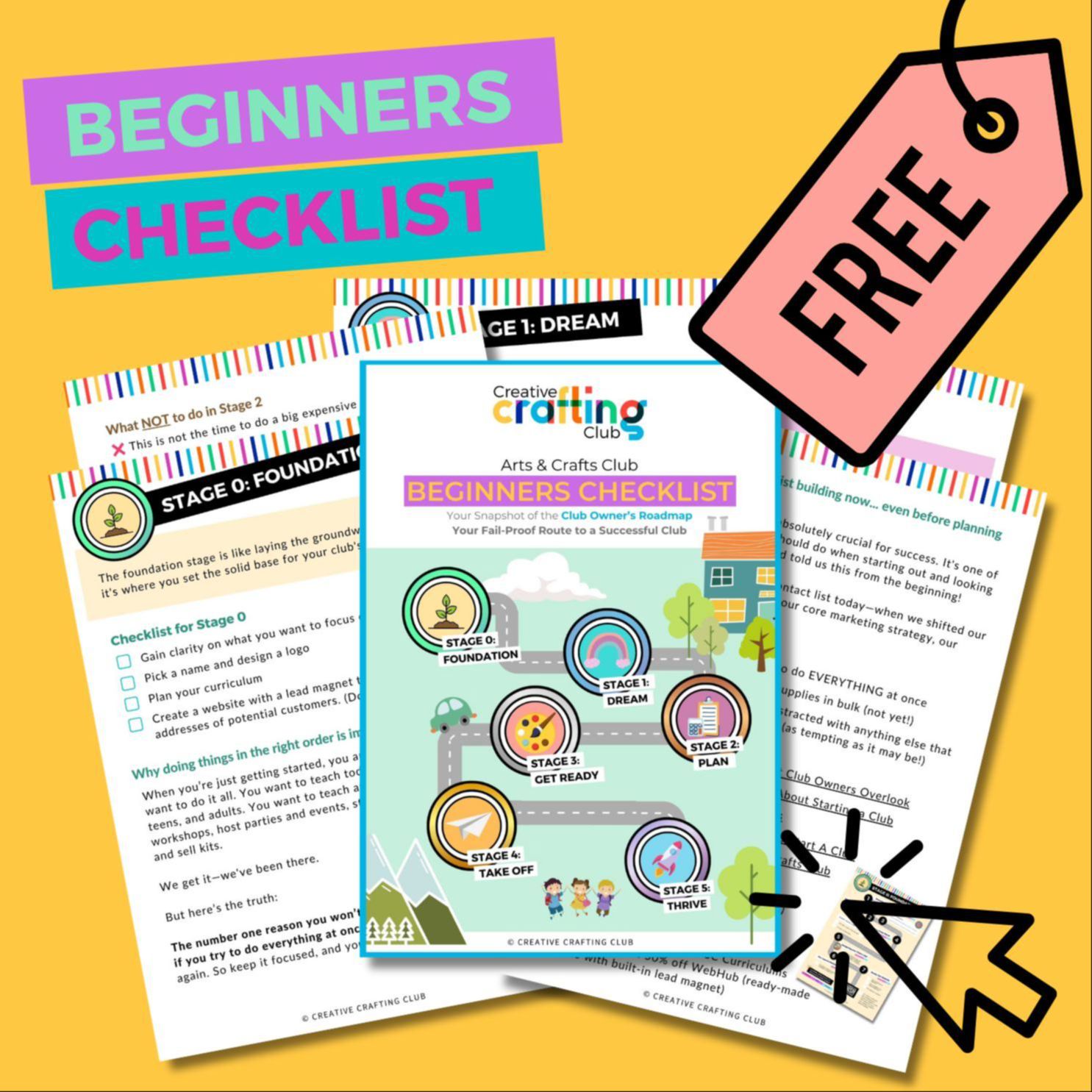Stop Letting Naysayers Kill Your Dreams: When to Listen and When to Walk Away
Posted on Jul 03, 2025When Stef told her best friend she was leaving her stable engineering job to start a craft business, his response was classic: "Wait, you're ditching engineering to play with glitter and hang out with kids? That's not even a real job! What's next, professional finger painting?"
Stef almost didn't go ahead. Her friend’s voice kept echoing in her head, making her second-guess everything. But then she decided to take the plunge anyway.
Fast forward two years, and Stef and her sister were teaching kids craft classes at 61 locations with an amazing team of teachers.
Fast forward another four years, and they've helped over 10,000 creatives start and grow their own clubs in over 80 countries, making an impact in their communities, earning income, gaining flexibility, and doing exactly what Stef dreamed of.
If Stef could filter advice and go from overworked and unfulfilled to running a thriving creative business that spans the globe, you can absolutely start your own successful craft club too.

Why People Try to Talk You Out of Your Dreams
Before we dive into handling the naysayers, let's talk about why they show up in the first place. Most aren't trying to be mean - they're just running on good old human psychology:
They're projecting their own stuff onto you. When someone says "You can't do that," they often mean "I don't think I could do that." It's less about you and more about their own self-doubt creeping into the conversation.
Fear hits harder than excitement. Psychologist Daniel Kahneman found that people feel the pain of loss about twice as strongly as the joy of gain.
So, when your aunt freaks out about you leaving your "secure" job, she's probably picturing you broke and overwhelmed, not smiling in a sunlit studio running fully booked craft classes.
The crab bucket effect is real. You know how crabs pull each other back down when one tries to escape? Some people do that too. When you start chasing a dream, it can make others feel uncomfortable about not chasing theirs.
Change makes people nervous. Most folks like things to stay the same. Even if it's your life changing, it still makes them feel wobbly. New paths can feel threatening, especially if they've been walking the same one for years.
Understanding these patterns doesn't mean people giving you advice are being malicious. Most are genuinely trying to protect you based on their own experiences and worldview.
The Two Types of Advice Givers

Not all advice comes from the same place. Learning to spot the difference helps you decide how much weight to give their input.
The Protective Pessimists are usually family and close friends who care about you but see the world through a lens of scarcity and risk. They say things like "What if it doesn't work out?" and "You have a good job, why risk it?"
✅ When to listen: When they raise specific, practical concerns you haven't thought about.
❎ When to tune out: When their advice comes from general fear rather than actual expertise.
The Experienced Advisors have relevant business experience, industry knowledge, or have walked a similar path. Someone just like Stef and Christelle, who run their own successful kids' craft club. They offer specific, actionable insights based on real experience.
✅ When to listen: Always. Their insights can help you avoid expensive mistakes.
❎ When to be cautious: When their experience is outdated or from a completely different industry.
How to Filter Advice Like a Pro

Research from Stanford shows that successful entrepreneurs share one key trait: they're picky about whose opinions influence their decisions. Here's how to develop that skill:
The Three-Question Filter
Before taking anyone's advice to heart, ask yourself:
- Does this person have relevant experience? If someone's never started a business, their entrepreneurship advice carries less weight than someone who has.
- What's their motivation? Are they trying to protect you from real risk, or projecting their own fears and limitations?
- Is this specific or general advice? "The craft market is oversaturated in your area" is specific and worth investigating. "Small businesses always fail" is general fear-mongering.
The Expertise Hierarchy
Rank your advice givers by their relevant experience:
- Tier 1: People who've successfully done what you're trying to do
- Tier 2: People with relevant business or industry experience
- Tier 3: People with general life wisdom but no specific expertise
- Tier 4: People reacting from fear or emotion
Real-Life Strategies for Handling Doubt
1. The Acknowledge and Redirect: "I appreciate that you care about my security. I've actually done quite a bit of research on this. Let me share what I've learned..."
2. The Specific Response: Counter general fears with specific plans.
- Naysayer: "What if no one comes to your classes?"
- You: "I've identified three marketing channels and already have an email list of 50 interested parents."
3. The Time-Boundary: "I value your input, but I've made my decision and would love your support as I move forward."
When Doubt Becomes Fuel
Here's something counterintuitive: the right kind of doubt can actually fuel your success. Use skepticism as motivation to prove your concept quickly, just like many successful craft club owners have done.
The key is to distinguish between productive doubt (which leads to better planning) and paralytic doubt (which leads to inaction).
Building Your Real Advisory Board
Instead of listening to everyone, intentionally build a small group of trusted advisors who have:
- Relevant experience in business or your industry
- Your best interests at heart
- The ability to give honest, constructive feedback
- Success in areas where you want to grow
This might include successful business owners, mentors in your field, or people who've navigated similar life transitions.
Don’t overlook the value of leaning into a craft club community, like the CCC community, made up of real people who’ve been exactly where you are and have built thriving clubs with creativity, courage, and care. They understand your journey and can offer support, insight, and encouragement that generic advice simply can’t match.

That kind of support can be the difference between staying stuck and building something truly successful.
The Permission You've Been Waiting For
If you're reading this feeling torn between your dreams and others' doubts, consider this your permission slip to trust your instincts.
The most successful entrepreneurs throughout history have had to filter out well-meaning but misguided advice.
Maybe this is you right now - scrolling through social media, wondering if you really have what it takes to start your own kids craft club.
The answer is yes. You just need to learn to filter advice through the lens of possibility, not fear.
Quick Recap

Remember Stef? She went from doubting herself because of one friend's comment to building a global creative business that's helped over 10,000 people.
If Stef could filter advice and go from overworked and unfulfilled to running a thriving creative business that spans the globe, you can absolutely start your own successful craft club.
Here's what we covered:
- Why people try to talk you out of dreams (spoiler: it's usually about them, not you)
- How to identify protective pessimists vs. experienced advisors
- The three-question filter to evaluate any advice
- Practical strategies for handling naysayers
- How to build your real advisory board
Your Next Steps
Identify your current advice givers: Write down who you typically turn to for guidance and honestly assess their relevant experience.
Practice the three-question filter: Next time someone offers unsolicited advice about your business idea, run it through the expertise, motivation, and specificity questions.
Find your tribe: Seek out a community of people doing what you want to do. Their encouragement and practical advice will be infinitely more valuable than general pessimism.
Trust your timeline: Just because someone else isn't ready for the leap doesn't mean you aren't.
Your dreams deserve better than to be dimmed by someone else's fears. Choose your advisors wisely, filter their input carefully, and remember that the biggest risk might not be trying and failing, but never trying at all.
Ready to Get Started?
Download our free Beginner’s Checklist and take the first step toward a flexible, creative business that fits your life.




